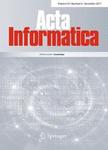版权所有:内蒙古大学图书馆 技术提供:维普资讯• 智图
内蒙古自治区呼和浩特市赛罕区大学西街235号 邮编: 010021

作者机构:IST Austria Inst Sci & Technol Austria A-3400 Klosterneuburg Austria Univ Mons UMONS Dept Comp Sci B-7000 Mons Belgium Univ Libre Bruxelles Dept Informat B-1050 Brussels Belgium
出 版 物:《ACTA INFORMATICA》 (信息学报)
年 卷 期:2014年第51卷第3-4期
页 面:129-163页
核心收录:
学科分类:0711[理学-系统科学] 07[理学] 08[工学] 070105[理学-运筹学与控制论] 081101[工学-控制理论与控制工程] 0701[理学-数学] 071101[理学-系统理论] 0811[工学-控制科学与工程] 0812[工学-计算机科学与技术(可授工学、理学学位)]
基 金:Austrian Science Fund (FWF) [P 23499-N23] FWF NFN [S11407] ERC [279307: Graph Games, 279499: inVEST] Microsoft faculty fellowship F.R.S.-FNRS. fellowship
主 题:QUANTITATIVE research MATHEMATICAL analysis SPECTRAL synthesis (Mathematics) BOUNDS (Mathematics) COMPUTER algorithms COMPUTER science GAME theory
摘 要:Multi-dimensional mean-payoff and energy games provide the mathematical foundation for the quantitative study of reactive systems, and play a central role in the emerging quantitative theory of verification and synthesis. In this work, we study the strategy synthesis problem for games with such multi-dimensional objectives along with a parity condition, a canonical way to express -regular conditions. While in general, the winning strategies in such games may require infinite memory, for synthesis the most relevant problem is the construction of a finite-memory winning strategy (if one exists). Our main contributions are as follows. First, we show a tight exponential bound (matching upper and lower bounds) on the memory required for finite-memory winning strategies in both multi-dimensional mean-payoff and energy games along with parity objectives. This significantly improves the triple exponential upper bound for multi energy games (without parity) that could be derived from results in literature for games on vector addition systems with states. Second, we present an optimal symbolic and incremental algorithm to compute a finite-memory winning strategy (if one exists) in such games. Finally, we give a complete characterization of when finite memory of strategies can be traded off for randomness. In particular, we show that for one-dimension mean-payoff parity games, randomized memoryless strategies are as powerful as their pure finite-memory counterparts.